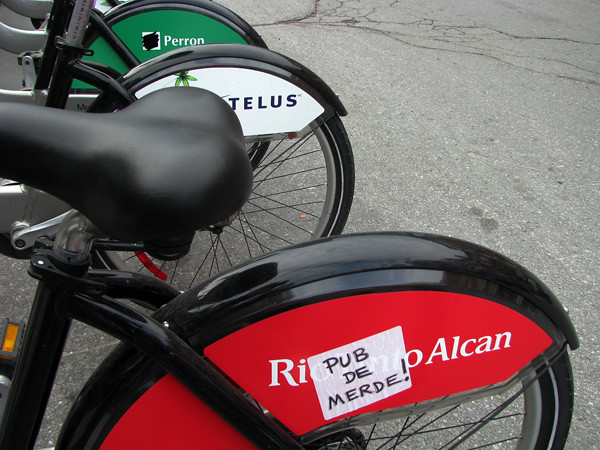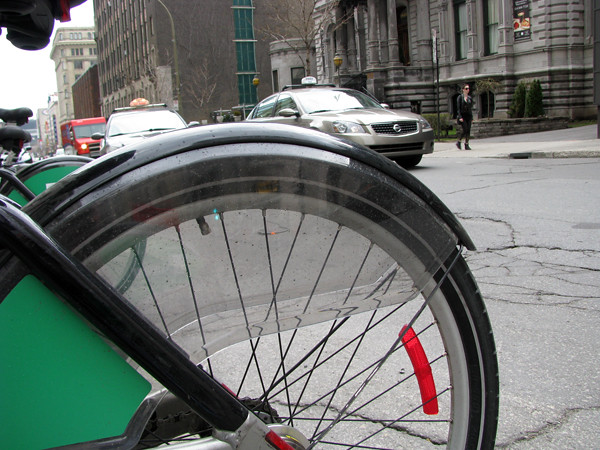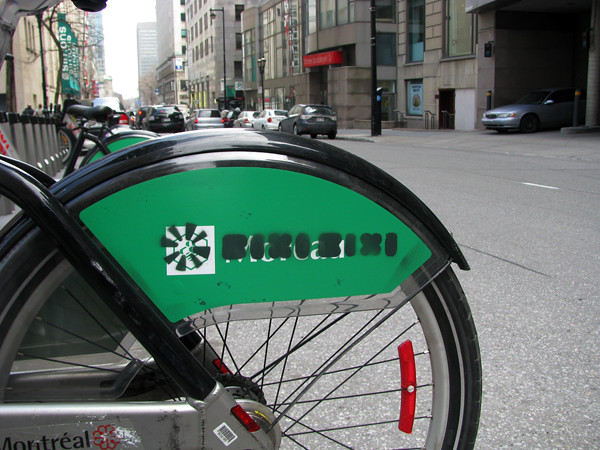
The third season of the Bixi bike sharing program has started with a few changes. More docking stations have been added to four more neighbourhoods, especially in the previously unserved central-western areas of the city such as NDG and Westmount (who grudgingly allowed a mere four stations to be set up in their city) while base times before needing to pay for trips have been extended from 30 minutes to 45.
Also new is the addition of advertising on the bicycles themselves. Despite a promise at the initial launch that there would be no advertising on Bixi bikes, they rolled out this spring with red, white, and green sponsors from three different companies covering a portion of the rear wheels.
The backlash was quick to come with a Facebook group that now has nearly a thousand members and a CBC Daybreak story that interviewed a membership holder who vowed not to renew due to the presence of the advertisements. The company who oversees the program was quick to respond to the criticism with a plea for users and the general public to put up with the ads to help the program cover costs. Indeed, more than just sponsorship was needed; the city just bailed out the company with a $108 million dollar loan after they threatened to pull the bikes from the roads and close up shop.
Obviously, unhappy Montrealers quickly took to vandalizing the ads in a variety of ways. Michel Philibert, porte-parole of Bixi is calling it “un phénomène marginal” but one sponsor is displeased about the negative attention the problem is bringing to its brand. One journalist took a walk around and found that of the 170 bikes observed, 42% of the ads were vandalized in some way or another. If people at Bixi are at all surprised, they obviously haven’t been paying attention to the Bixi programs they have been exporting to other cities, particularly London where their “Barclays Bikes” fell victim to an anti-Barclays sticker campaign within hours of its launch.
Initially, I was put off by the ads on the bikes, but after spending an afternoon walking around downtown taking photos of some of the vandalism, I was pleased to find that the ads have provided a new, mobile space for Montrealers to spread messages and/or express their creativity. Much of the vandalism is simple tags either on a sticker or done with a marker while others are quite artistic. My favourites are the ones that covered the expensive advertisements of giant corporations in favour of advertisements for small local events or causes. Not only can these messages be put on bikes all over the city, but owing to their being a means of transportation, also move from place to place as the bike is borrowed and replaced. Below (after the jump) are some examples of how the ads have been re-appropriated by some industrious residents of the city.
As in London, some of the advertising vandalism attacks the advertisers themselves:

Many are simple tags that have been applied either with a marker or a sticker. This bike has had both:

April 15th was Steal Something From Work Day:

Somebody found a way to simply remove the ad altogether bringing the bike back to its sleek look of past years:

These stickers advertising the annual May Day parade were on a number of bikes all over the city:

A stencil covering a Desjardins ad in favour of an advertisement for Bixi itself:

Anti-election messages:

This stencil incorporates the Telus logo to make it say “Bixi Wait Loss”. I’m not really sure what they’re trying to say with this:

A sticker of a bird carrying a sign:

Finally, a simple piece of electrical tape covering up a logo:


18 comments
“I was pleased to find that the ads have provided a new, mobile space for Montrealers to spread messages and/or express their creativity”.
Creativity? Really?
I found those pseudo-anarchists (they still want a subsidized service I bet) quite juvenile.
Living in Asia right now, I have never seen vandalism performed anywhere. But I do see much cheaper and cleaner public transportation.
I found it odd that vandalism with no merit would be celebrated (and I don’t see how the fact that it targets the advertisers changes anything).
I suppose it’s cool to attack advertising, just as it’s cool to attack corporations and the “spread of corporatism”.
Unfortunately, services such as Bixi cost money, and advertising is a logical way of financing the services we need without increasing user fees. So, uncool as I may seem, I am baffled by the reflexic, dogmatic opposition to advertising by the same stakeholders who so clearly benefit from its revenue.
Anyway, knock yourselves out. I guess I’m not cool enough to think that the money required for our services will materialize out of nowhere.
As an international student from a poor country with lots of street art, I find most of Montreal vandalism extremely uncreative and an eyesore. It seems most vandals here do these things just to rebel from their boring life, and really want the city to look ugly rather than more interesting. The fact that so many hipsters praise even the lamest of vandalism is also risible (I’ve heard some praising litter as street art, I swear).
That said, they should make these panels a space for public posting. That would probably deter taggers and encourage actually intelligent people to post nice images. Sadly advertisement was the only solution they could think of to make the system rentable, one that will never work in a city were respect for public urban projects is not part of the culture (see how people treat the Parc/Pines intersection or the recently revamped Main among other examples).
Montreal without bixi are not Montreal anymore …
it’s good to see that people used those ad spaces as expression board, but there’s also more artistic ways to use those ads…
http://www.facebook.com/pages/biksy/121180061298706
Josh Reuben (comment above) inspired me to make this:
http://www.flickr.com/photos/67318949@N00/5735825044/in/photostream
:)
The ads have to go. No one consented for every residential street in Montreal to be covered in ads.
BIXI is great but there’s limits on how uglified you can make Montreal.
It’s similar to the metro – the ads do close to nothing to covering the deficit, but somehow transform a good chunk of our city into (insert comparison which matches your level of disgust)
I dislike ads but consider them a useful source of income. After all the metro is full of them. And try watching TV.
I dislike spraypainters even more. I would go so far as to say they disgust me. Have a look at what they have done to signposts on Mt. Royal. I suppose the Bixi painters will say that they are not the same people but to me they tar themselves with the same brush (kind of joke)
Has Bixi disclosed how much money is being made from those ads?
Since they want to be seen as a pseudo-public service that deserves loan guarantees, that should be public knowledge. Is it significant?
I have heard that the ads are bringing in $2 million annually. If I understand correctly, the operating cost for Bixi in mtl is $13 million annually (not including the capital investment in the bikes and stands)
http://blogs.montrealgazette.com/2011/05/17/bixi-by-the-numbers/
I’m not sure whether that pushes it one way or another.
I know the work I do, with at risk youth through a charity organization, is possible in large part thanks to corporate sponsors. But we would never stand for turning our participants into walking (or cycling) billboards. My experience also proves that there are more subtle and tasteful ways to highlight companies’ support.
One more comment concerning the ugly stickers: Since the majority of us clearly incline towards respect, I encourage all users to do what I have done: remove the vandals stickers before taking the bike. It is usually not that hard and only takes a minute. Also do the same with all of your street’s bixi station bikes whenever you have time.
Chris Erb, Alanah Heffez, there are more tasteful ways to show your opposition to the idea of having ads on the bikes. One is getting involved with Bixi and proposing better ways for making it rentable (rather than just saying “there are other ways”). Making it look uglier actually harms the company.
Rio Tinto Alcan, a local company, provides the aluminium for the bikes, and is the second largest aluminium company in the world. Desjardins, also local, is the largest association of credit unions in North America.
The comments on this post make me proud to know there are still smart and respectful people concerned for this city. This pride is often taken away by blog articles like this one.
Adolf, how does one get involved with Bixi? They seem happier to sue developers than to listen to what we’ve got to say.
Daniel, they have a facebook page (they seem to interact a lot), twitter, email address, phone numbers. They also have head offices. If everything fails, there are newspapers in many languages in Montreal which are happy to publish your opinion letters. If this fails you can make blogs, websites for free, facebook pages, and make your voice heard in many wonderful ways. You can even start your own bike sharing system and compete!
Uglifying the city with angry images, or romanticizing *everything* that is disorderly, is closed-minded and outdated. Strangely I see this mentality a lot in cities like Montreal, which have all the means to do things in a better way.
Adolf, why do you think it’s okay for large corporations to psychologically implant their logos in our minds, but not for the people of this city to ‘tag over’ these corporate ‘tags?’ Do corporations really have the right to do whatever hey want to the environment? Would you stop The People from stopping them?
Wannabe anarchists have always frustrated me and this just seems like another case of teenage angst and boredom being released upon the city. While of course few people find advertising attractive, why would cycling advocates be opposed to businesses that actual support such a great public bike-share system? Oh yeah I forgot… “the man” is coming to get you.
I would agree with Adolf, that while corporate adds are pervasive and I would like to see less of them, encouraging the vandalizing of BIXI bikes is just an example of hipster arrogance and ignores the very real cost of funding what is essentially a business start up. The position that the 2$ million in funding that the adds are bringing to BIXI is somehow minor is also ridiculous, that funding has a real impact that is directly delivered to users.
The irony is also that most of the same people who are against the BIXI adverts also are demanding that corporations spend more money on encouraging sustainability, and healthy living, but these same people are vandalising the efforts of the companies that are doing so. The fine print on the TELUS sponsorship for example mandated that the funding be put towards extending the sign out time, which is a direct benefit to users as they can now use BIXIs for an additional 15 min per session, at no additional cost to themselves.
Perhaps people/artists or anti advertising crusaders who have such a problem with the adds could approach BIXI and ask if they can sponsor a bike directly and see if they can create an agreement wherein they may use space set aside for advertising themselves, ‘sponsor a BIXI.’ Of course this would require people to put their money where their mouth is so I doubt there would be any takers.
Hi QATZELOK. In the strictly legal sense, yes, corporations have the right to do almost whatever they want with their property, just as you have the right to tag your bedroom walls and wear shiny clothes.
In the moral sense however, I agree with you, Bixi shouldn’t betray their principles by visually polluting the environment. But that doesn’t make it right for you to do the same thing. It is not right for you to hit someone in the face just because he did it first. Even worse would be for you to hit a bunch of people in the face just because someone else di it before you. By tagging, you would be making lots of people unhappy, just as Bixi made lots of us unhappy by putting up the ads. I suggest focusing our energies on trying to make people happier by proposing better ways, rather than destroying everything that doesn’t fit our taste. In case this is not clear, I am not saying what you and Spacing are doing is wrong. I am just against those that you are defending.
Just a quick general and probably unrelated note: In my home country the word “anarchy” usually means making your community better despite what the more powerful want. That includes things like helping those who need it, fighting for justice and against crime, cleaning up your streets by yourself, and making your city a better place. I am shocked to see that in Canada, “anarchy” means destroying things and burning police cars. I want to feel welcome here but it’s hard when so many people think that the answer to every issue is destruction of public and private property and making some people feel bad rather than working towards making the community feel good.
I found those pseudo-anarchists (they still want a subsidized service I bet) quite juvenil
Here’s an idea: rather than having “subsidized service”, why not elimiinate loopholes, and actually tax corporations to help pay for the matrix of services that they benefit from. Then use that money to pay for things like bikeshare. And skip the whole, “Brought to you by Acme Holdings LLC: Making Your Life Better” B.S..